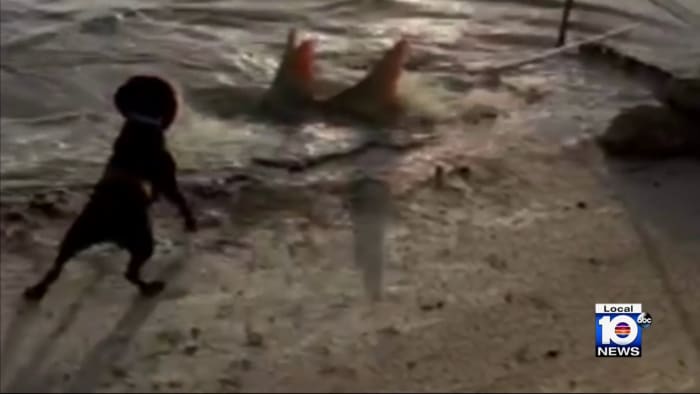Bizarre fish behavior baffles experts in Lower Florida Keys – WPLG Local 10
Louis Aguirre, Anchor/Reporter/Environmental Advocate
Anastasia Pavlinskaya Brenman, Producer
Published:
Updated:
Louis Aguirre, Anchor/Reporter/Environmental Advocate
Anastasia Pavlinskaya Brenman, Producer
BIG PINE KEY, Fla. – A marine mystery has researchers searching for answers in the Lower Florida Keys.
Since December, 20 critically endangered smalltooth sawfish have been reported dead, according to the latest numbers from the Florida Fish and Wildlife Conservation Commission.
“This is a very large species and the size of the sawfish we’re seeing coming inshore and eventually dying,” said Gil McRae, director of FWC’s Fish and Wildlife Research Institute.
And while smalltooth sawfish are the only species reported dead, they are not the only ones seeing an impact.
“That’s not something I’ve ever seen fish do…ever,” said Gregg Furstenwerth, a resident of Little Torch Key.
More than a dozen species of all sizes from pinfish to grouper have been observed acting erratically, spinning, and distressed.
It’s leaving longtime residents like Furstenwerth, who is also a technical diver, with deep concerns.
“It’s disturbing if it keeps going it’s the end of an ecosystem as we know it,” said Furstenwerth.
The event seems to be centered between Cudjoe and Big Pine Key, but residents have reported sightings to Local 10 from Key West to Marathon.
“You can pretty much see this happening every day,” said Furstenwerth.
The diver has been diligently documenting the spinning fish since late last year.
“Are you seeing more and more species being impacted?” asked Local 10 News anchor and environmental advocate Louis Aguirre.
“Yes,” responded Furstenwerth.
At the moment, no one knows what’s behind the strange occurrence.
So far, early testing has ruled out red tide, low oxygen, disease and other pathogens.
“Our current line of inquiry are focusing on potential biotoxins produced by algae in the water “, FWC’s McCrae told Local 10. “Right now, we do not have a smoking gun relative to a particular toxin that may be causing these issues.”
Aguirre asked McCrae if there are any risks to humans.
“What we’re saying is, if you see a fish swimming erratically, if you catch a fish that doesn’t appear to be healthy, it’s best to avoid consuming that fish”, he said.
“As of right now, there’s no indication that there’s a toxin in the water or a toxin in the fish that are commonly consumed”.
Donna Hart, manager of Lower Keys Tackle says that to her knowledge, this has only been documented inland. The longtime Keys resident and host of 104.1 FM’s “This Week in Fishing” radio show stressed that offshore fishing has not been impacted.
“I don’t want people to be afraid to come and enjoy the Florida Keys and get out on the water and go fish and go snorkeling,” she said. “There’s no impact — no impact whatsoever beyond our nearshore waters that I’m aware of right now.
Scientists remain baffled while continuing to focus on fish physiology and toxicology.
“The thing is we don’t know what it is,” said Dr. Martin Grosell, professor and chair of the University of Miami Rosentiel School’s Grosell Lab.
“We don’t know if this is, you know, just a preamble (or) if this is going to get a lot worse. We don’t know if it’s going to spread to other areas.”
“I really do think we need to get on top of this,” he added.
Local 10′s environmental team is monitoring this story and will air an extended report Wednesday at 5 p.m. and 11 p.m. during Don’t Trash Our Treasure.
If you witness or have witnessed this strange fish behavior, send your videos to DTOT@local10.com.
FWC released a statement Thursday, which you can read below:
“FWC staff are coordinating the recovery of smalltooth sawfish carcasses, which is aided by reports to the sawfish hotline 844-4SAWFISH or sawfish@myfwc.com. Samples from carcasses are being sent to FWC’s Fish Health group for analysis and/or distribution to experts elsewhere. Under the Endangered Species Act, it is illegal to catch, harm, harass, or kill an endangered sawfish. It is also unlawful to possess, sell, carry, or transport sawfish or parts of sawfish—such as the rostrum. While some fishermen catch sawfish as bycatch, they can follow safe handling and release guidelines to quickly and safely release incidentally captured sawfish.
The FWC has also been documenting reports of abnormal fish behavior (spinning and whirling) in the Lower Keys (e.g. Summerland Key, Big Pine Key, Little and Big Torch Keys). FWC is working with partners and stakeholders to investigate the behavior. At this time, the cause of the abnormal behavior is not known, and efforts to collect and analyze samples are ongoing.
As we continue to respond to this event the FWC holds steadfast to working collaboratively with our conservation partners, stakeholders and the community. Public reports are an essential resource to our investigation into this event. Please report abnormal fish behavior and fish kills to FWC’s Fish Kill Hotline at 800-636-0511 or MyFWC.com/ReportFishKill.”
Copyright 2024 by WPLG Local10.com – All rights reserved.
Louis Aguirre is an Emmy-award winning journalist who anchors weekday newscasts and serves as WPLG Local 10’s Environmental Advocate.
email
facebook
twitter
email
If you need help with the Public File, call (954) 364-2526.
Copyright © 2024 Local10.com is published by WPLG INC., a Berkshire Hathaway company.



